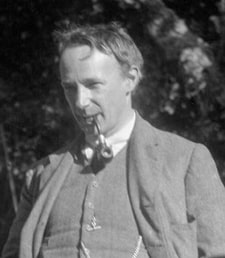G.E. Moore (1873-1958) grew up in South London (his eldest brother was the poet T. Sturge Moore, who worked as an illustrator with W. B. Yeats). In 1892, he enrolled at Trinity College in Cambridge, England, to study Classics. He soon met Bertrand Russell and J. M. E. McTaggart, who were two years ahead of him at Trinity College. Moore’s professors were supportive of his decision to study philosophy in addition to classics, and he graduated with a first-class degree in the subject in 1896. At this point, he turned his attention to trying to win a ‘Prize’ Fellowship at Trinity College, which would allow him to continue his study of philosophy there.
In 1898, he was a successful philosopher and over the next six years he matured as a dynamic young philosopher. In fact, he eventually led Russell away from the idealist philosophy of McTaggart and others which was then dominant in Britain. Moore’s fellowship ended in 1904, and after a spell away from Cambridge, Moore returned there in 1911 to a lectureship in the University. He then lived there for the rest of his life.
G.E. Moore became the editor of Mind, the leading British philosophical journal, in 1921, and in 1925, he became a Professor at Cambridge. These two appointments confirm that the philosopher in question is highly respected by his peers, and that Cambridge – which is now back in the hands of Wittgenstein – is once again the most important center of philosophy in the world. Moore retired as a professor in 1939 and as the editor of Mind in 1944. These retirements signaled the end of his pre-eminence and the beginning of a new era of Cambridge philosophy.
Moore’s work dealt with problems such as the nature of sense perception and the existence of other spirits and material things. He was not as skeptical as those philosophers who believed that we do not have enough data to prove that objects exist outside our own minds, but he did believe that the proper philosophical evidence has not yet been invented to overcome such objections. Although few of Moore’s theories were accepted by the general population, his unique approaches to certain problems and his intellectual rigor helped change the texture of philosophical discussion in England.
His other major writings include Philosophical Studies (1922), Some Main Problems of Philosophy (1953), and Philosophical Papers (1959); posthumous publications were Philosophical Papers (1959) and the Commonplace Book, 1919-1953 (1962).
Moore was successful in his professional career and had a happy family life. In 1916, at the age of 43, he married his former student, Dorothy Ely, and the couple had two sons. According to most reports, Moore died in Cambridge on October 24, 1958, and was buried in the churchyard of St. Giles’.


